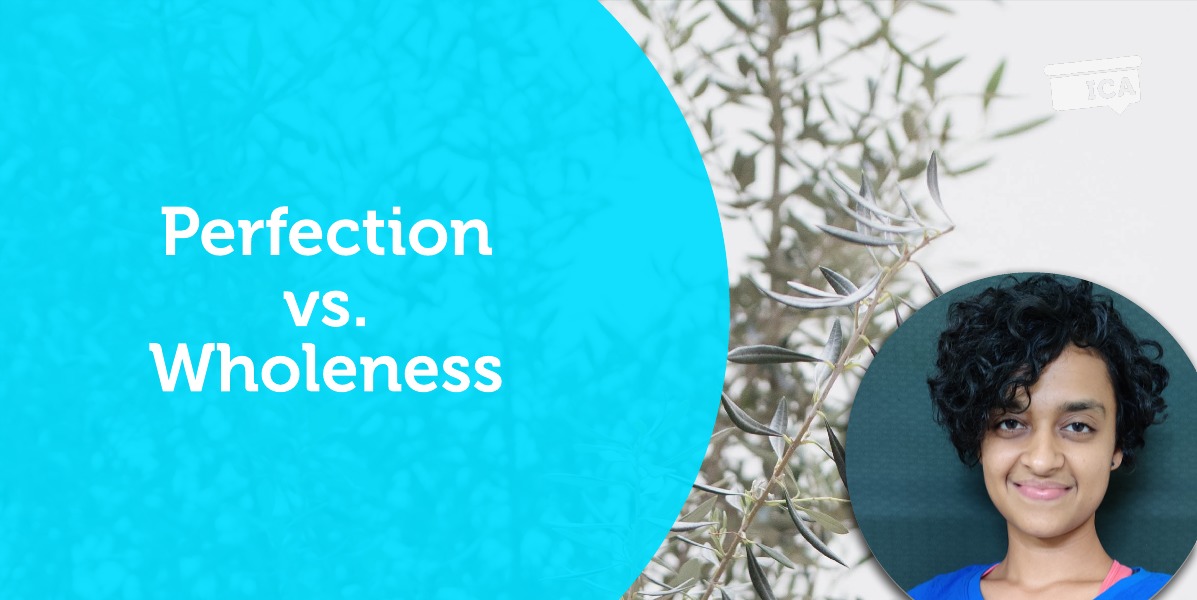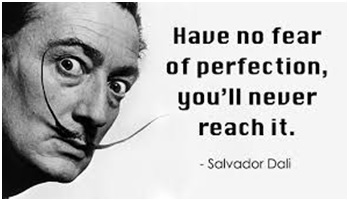
A Coaching Power Tool Created by Radhika Bhalerao
(Wellness Coach, INDIA)
What’s the story?
In my own journey, the unceasing quest for perfection led to me to a point of paralyzed inaction. I could only see two options: perfection or nothing at all. I was fixated on the results with complete disregard for the process. The pressure to perform was tremendous, but no expedition ever made it beyond paper. I was caught in a downward spiral of anxiety, self-deprecation, and sadness.
 Over time I came to ask myself a simple question: What is perfection, anyway?
Over time I came to ask myself a simple question: What is perfection, anyway?
In trying to answer this, I uncovered the value of wholeness.
This change in perspective on how to approach any process has helped me make incredible strides in my own life. Therefore, I decided to choose this as my power tool.
So, what is perfection, anyway?
On the surface, perfection looks innocuous. There seems nothing wrong in wanting to put your best foot forward. This is often seen as a positive trait and even encouraged in most cultures. However, perfection isn’t about high standards, just unrealistic ones. It keeps you trapped in an endless zone of striving for the unachievable. Because, what is perfection, anyway?
Its underbelly is daubed with anxiety, depression, feelings of inadequacy or failure, and a host of other mental health issues. This translates into inaction, which contributes to the severity of these issues, leading to more inaction and on it goes.
Perfectionists base their self-worth on external achievements, which incidentally are elusive. With unreasonable goals in view, perfectionists are never satisfied, feel invalidated without ‘best performance’, and have immense shame around the idea of mistakes. Moreover, they reject support. This perspective can make an appearance in all domains of an individual’s functioning, personal, or professional. However, perfection doesn’t lead to accomplishment. Instead, it facilitates the undermining of our own potential and programs us to act in self-defeating ways.
When we look at its practical manifestations, among other things it can cause procrastination, excessive fear of failure, overly controlling behaviors, and like in my case, complete inaction.
From criticism to compassion
Instead of building something perfect, what if you formed something completely? A harmonious whole. Something that welcomes the good, the bad, and everything in between. Something that finds joy in the process and recognizes the beauty in flaws and the fun in making mistakes!
Pema Chödrön puts it succinctly in her book The Wisdom of No Escape:
If we see our so-called limitations with clarity, precision, gentleness, good-heartedness, and kindness and, having seen them fully, then let go, open further, we begin to find that our world is vaster and more refreshing and fascinating than we had realized before. In other words, the key to feeling more whole and less shut off and shut down is to be able to see clearly who we are and what we’re doing.
Wholeness is a mindset and just like perfection, means widely different things for different people. At its core, this kind of mindset allows us to truly see who we are. Not just our excellence, but our idiosyncrasies as well. Our whole.
To someone who values wholeness, self-worth is an inherent quality. They are aware of their own uniqueness, beliefs, and even vulnerabilities. When seeking wholeness, the emphasis is on progressive development and balance rather than the endpoint. They accept setbacks as learning opportunities. Where in a perfect state of mind, the uncertainty seems to induce fear, in a wholeness mindset it creates excitement and curiosity to explore. This is a space in which identification of limitations is a launchpad, not quicksand.
 In contrast to perfection, wholeness helps us take responsibility for our decisions. It cultivates in us the ideals of forgiveness and humility and more importantly, it helps us embrace the process without fixating over the results.
In contrast to perfection, wholeness helps us take responsibility for our decisions. It cultivates in us the ideals of forgiveness and humility and more importantly, it helps us embrace the process without fixating over the results.
Moreover, the pursuit of perfection makes us oblivious, while seeking wholeness brings us self-awareness and the value of just being.
Coaching application
For the relentless seeker of perfection, inner peace is elusive. For this kind of person, the shift from criticism to compassion could create an environment of learning which allows mistakes to happen.
As a coach, it would be helpful to assist the client in uncover disempowering underlying beliefs that do not serve them. This will encourage them to gain awareness of the beliefs that drive them to action (or inaction). Most often than not, clients are unaware of the formation and hold that these beliefs have over their lives. In a coaching space, simply talking aloud (with intent) can help the client become aware of these beliefs.
Another great way to discover such underlying beliefs is by inquiring about the emotions or thoughts. Speaking from personal experience, the belief that everything I did had to be perfect left me drained, disempowered, and feeling hopeless. Therefore, learning about emotions is a good indicator of the existence and nature of the underlying belief.
For a client who knows nothing other than the need to be perfect, uncovering a rigid belief and discovering a new perspective can, in fact, be daunting. In this scenario, the coach can encourage the client to think about their vision, its importance, and the values that drive it.
Also, it is important for the coach to communicate feedback effectively and masterfully. A client struggling with perfectionism has no dearth of criticism. Therefore, the feedback should be objective, constructive, and one that encourages the finding of new opportunities.
Some questions that may be helpful in a coaching conversation:
Q: What’s the perfect question for me to ask you right now?
Q: How do you feel when you believe ____________ thought?
Q: Who would you be without _____________thought?
Q: How will these emotions/thoughts serve you now and in the future?
Q: What does your inner voice want to communicate to you about this?
Q: What would wholeness feel/look like?
Q: If you had no limitations, who would you be?
Q: What could you do differently this time around?
Q: What can you control this situation?
Q: If you weren’t concerned about the results, what would you do differently?
Q: What advice would you give someone else in a similar situation?
Q: How could you work with these challenges and experience your new narrative?
Q: How does __________relate to your values and life purpose?
Q: How will you know to ask for support?
Q: What acknowledgment would you like to give yourself?
With these types of questions, coaches can help drive a shift in perspective of the client from perfection to wholeness and motivate action and progress.
Reflection
- What are some of your own underlying beliefs regarding the coaching process?
- How can you reframe limiting beliefs into empowering ones? What would be different?
- What would happen in your life if you didn’t give yourself the space to make mistakes?
- What is your perspective around wholeness?
- How can you maintain self-awareness in a coaching conversation?
References
ICA modules on Coach Skills
ICA modules on Power Tool
Amanda. R. (2018). The dangerous downside of perfectionism. BBC Future.
https://www.bbc.com/future/article/20180219-toxic-perfectionism-is-on-the-rise
Ashkenas. R. (2011). The problem with perfection. Harvard Business Review.
https://hbr.org/2011/08/the-problem-with-perfection.html
Byron. K. (2011). Questioning beliefs that cause suffering. From BEYOND BELIEF.
https://www.youtube.com/watch?v=TxkjfejHcbw&feature=youtu.be
Khazan. O. (2018). The problem with being perfect. The Atlantic.
https://www.theatlantic.com/health/archive/2018/11/how-perfectionism-can-be-destructive/574837/
Pema. C. (2011). The wisdom of no escape.
Theophil. M. (2009). Perfection or wholeness. Economic Times.
https://economictimes.indiatimes.com/opinion/vedanta/perfection-or-wholeness/articleshow/4258011.cms